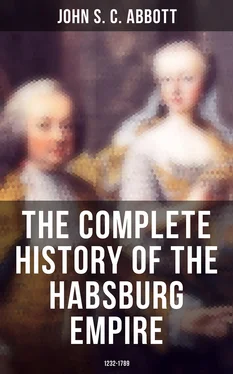The doom of the King of Naples was now sealed. All unconscious that his own relative, Ferdinand of Arragon, was conspiring against him, he appealed to Ferdinand for aid against the King of France. The perfidious king considered this as quite a providential interposition in his favor. He affected great zeal for the King of Naples, sent a powerful army into his kingdom, and stationed his troops in the important fortresses. The infamous fraud was now accomplished. Frederic of Naples, to his dismay, found that he had been placing his empire in the hands of his enemies instead of friends; at the same time the troops of Louis arrived at Rome, where they were cordially received; and the pope immediately, on the 25th of June, 1501, issued a bull deposing Frederic from his kingdom, and, by virtue of that spiritual authority which he derived from the Apostle Peter, invested Louis and Ferdinand with the dominions of Frederic. Few men are more to be commiserated than a crownless king. Frederic, in his despair, threw himself upon the clemency of Louis. He was taken to France and was there fed and clothed by the royal bounty.
Maximilian impatiently watched the events from his home in Austria, and burned with the desire to take a more active part in these stirring scenes. Despairing, however, to rouse the German States to any effectual intervention in the affairs of southern Europe, he now endeavored to rouse the enthusiasm of the German nobles against the Turks. In this, by appealing to superstition, he was somewhat successful. He addressed the following circular letter to the German States:
"A stone, weighing two hundred pounds, recently fell from heaven, near the army under my command in Upper Alsace, and I caused it, as a fatal warning from God to men, to be hung up in the neighboring church of Encisheim. In vain I myself explained to all Christian kings the signification of this mysterious stone. The Almighty punished the neglect of this warning with a dreadful scourge, from which thousands have suffered death, or pains worse than death. But since this punishment of the abominable sins of men has produced no effect, God has imprinted in a miraculous manner the sign of the cross, and the instruments of our Lord's passion in dark and bloody colors, on the bodies and garments of thousands. The appearance of these signs in Germany, in particular, does not indeed denote that the Germans have been peculiarly distinguished in guilt, but rather that they should set the example to the rest of the world, by being the first to undertake a crusade against the infidels."
For a time Maximilian seemed quite encouraged, for quite a wave of religious enthusiasm seemed to roll over Europe. All the energies of the pope were apparently enlisted, and he raised, through all the domains of the Church, large sums of money for the holy enterprise of driving the invading infidels out of Europe. England and France both proffered their co-operation, and England, opening her inexhaustible purse, presented a subsidy of ten thousand pounds. The German nobles rallied in large numbers under the banner of the cross. But disappointment seemed to be the doom of the emperor. The King of France sent no aid. The pope, iniquitously squandered all the money he had raised upon his infamous, dissolute son, Cæsar Borgia. And the emperor himself was drawn into a war with Bavaria, to settle the right of succession between two rival claimants. The settlement of the question devolved upon Maximilian as emperor, and his dignity was involved in securing respect for his decision. Thus the whole gorgeous plan of a war against the Turks, such as Europe had never beheld, vanished into thin air, and Maximilian was found at the head of fourteen thousand infantry, and twelve thousand horse, engaged in a quarrel in the heart of Germany. In this war Maximilian was successful, and he rewarded himself by annexing to Austria several small provinces, the sum total of which quite enlarged his small domains.
By this time the kings of France and Spain were fiercely fighting over their conquest of Naples and Sicily, each striving to grasp the lion's share. Maximilian thought his interests would be promoted by aiding the Spaniards, and he accordingly sent three thousand men to Trieste, where they embarked, and sailing down the Adriatic, united with the Spanish troops. The French were driven out of Italy. There then ensued, for several years, wars and intrigues in which France, Spain, Italy and Austria were involved; all alike selfish and grasping. Armies were ever moving to and fro, and the people of Europe, by the victories of kings and nobles, were kept in a condition of misery. No one seemed ever to think of their rights or their happiness.
Various circumstances had exasperated Maximilian very much against the Venetians. All the powers of Europe were then ready to combine against any other power whatever, if there was a chance of obtaining any share in the division of the plunder. Maximilian found no difficulty in secretly forming one of the most formidable leagues history had then recorded, the celebrated league of Cambray. No sympathy need be wasted upon the Venetians, the victims of this coalition, for they had rendered themselves universally detestable by their arrogance, rapacity, perfidy and pride. France joined the coalition, and, in view of her power, was to receive a lion's share of the prey—the provinces of Brescia, Bergamo, Cremona, and the Ghiradadda. The King of Arragon was to send ships and troops, and receive his pay in the maritime towns on the shores of the Adriatic. The pope, Julius II., the most grasping, perfidious and selfish of them all, demanded Ravenna, Cervia, Faenza, Rimini, Immola and Cesena. His exorbitant claims were assented to, as it was infinitely important that the piratic expedition should be sanctioned by the blessing of the Church. Maximilian was to receive, in addition to some territories which Venice had wrested from him, Roveredo, Verona, Padua, Vicenza, Trevigi, and the Friuli. As Maximilian was bound by a truce with Venice, and as in those days of chivalry some little regard was to be paid to one's word of honor, Maximilian was only to march at the summons of the pope, which no true son of the Church, under any circumstances, was at liberty to disobey. Sundry other minor dukes and princes were engaged in the plot, who were also to receive a proportionate share of the spoil.
After these arrangements were all completed, the holy father, with characteristic infamy, made private overtures to the Venetians, revealing to them the whole plot, and offering to withdraw from the confederacy and thwart all its plans, if Venice would pay more as the reward of perfidy than Rome could hope to acquire by force of arms. The haughty republic rejected the infamous proposal, and prepared for a desperate defense.
All the powers of the confederacy were now collecting their troops. But Maximilian was dependent upon the German diet for his ability to fulfill his part of the contract. He assembled the diet at Worms on the 21st of April, 1509, presented to them the plan of the league, and solicited their support. The diet refused to cooperate, and hardly affecting even the forms of respect, couched its refusal in terms of stinging rebuke.
"We are tired," they said, "of these innumerable calls for troops and money. We can not support the burden of these frequent diets, involving the expense of long journeys, and we are weary of expeditions and wars. If the emperor enters into treaties with France and the pope without consulting us, it is his concern and not ours, and we are not bound to aid him to fulfill his agreement. And even if we were to vote the succors which are now asked of us, we should only be involved in embarrassment and disgrace, as we have been by the previous enterprises of the emperor."
Such, in brief, was the response of the diet. It drew from the emperor a long defense of his conduct, which he called an "Apology," and which is considered one of the most curious and characteristic documents of those days. He made no attempt to conceal his vexation, but assailed them in strong language of reproach.
Читать дальше












